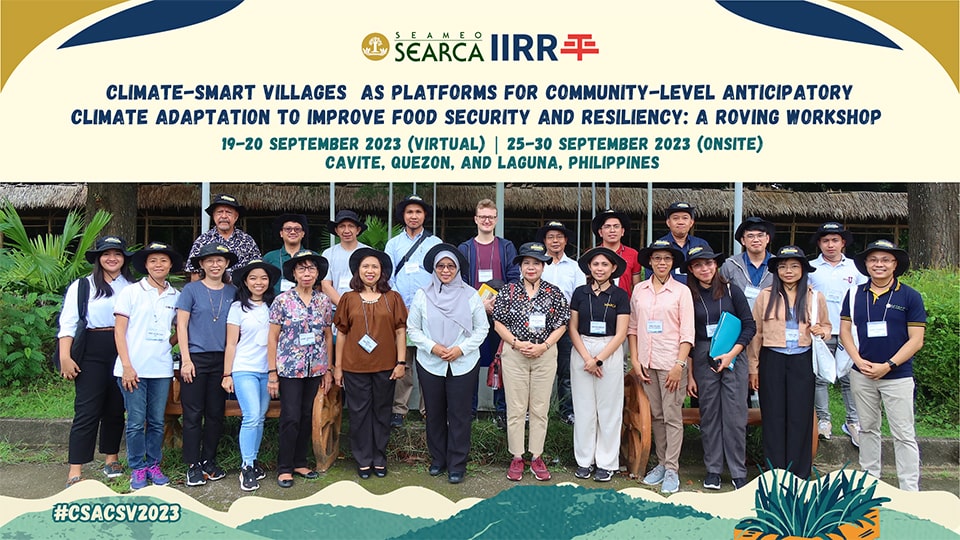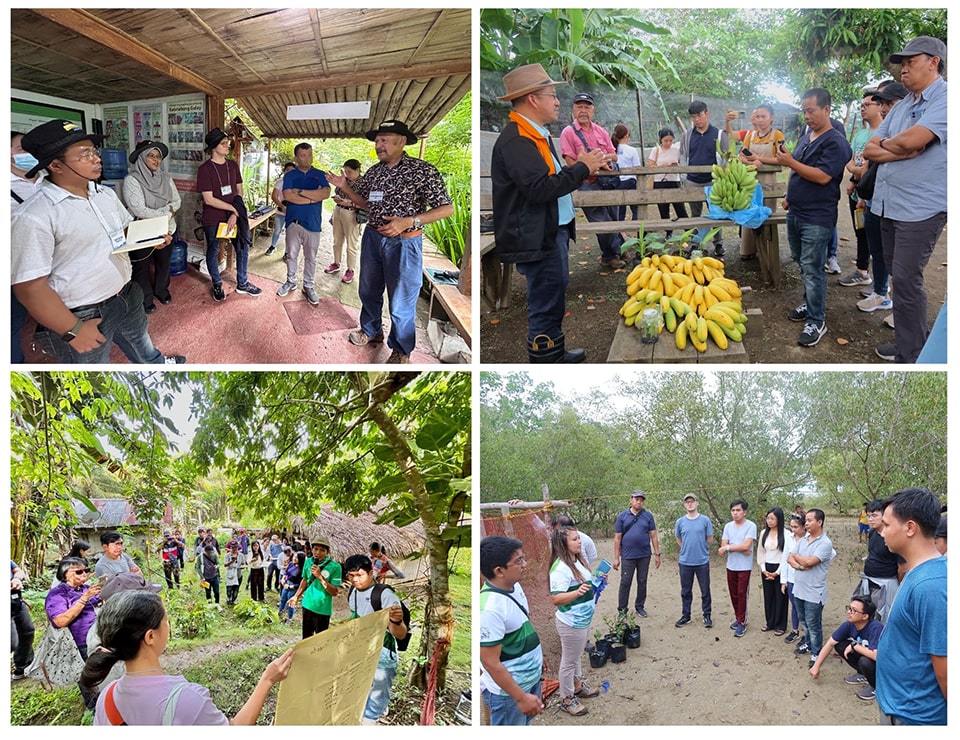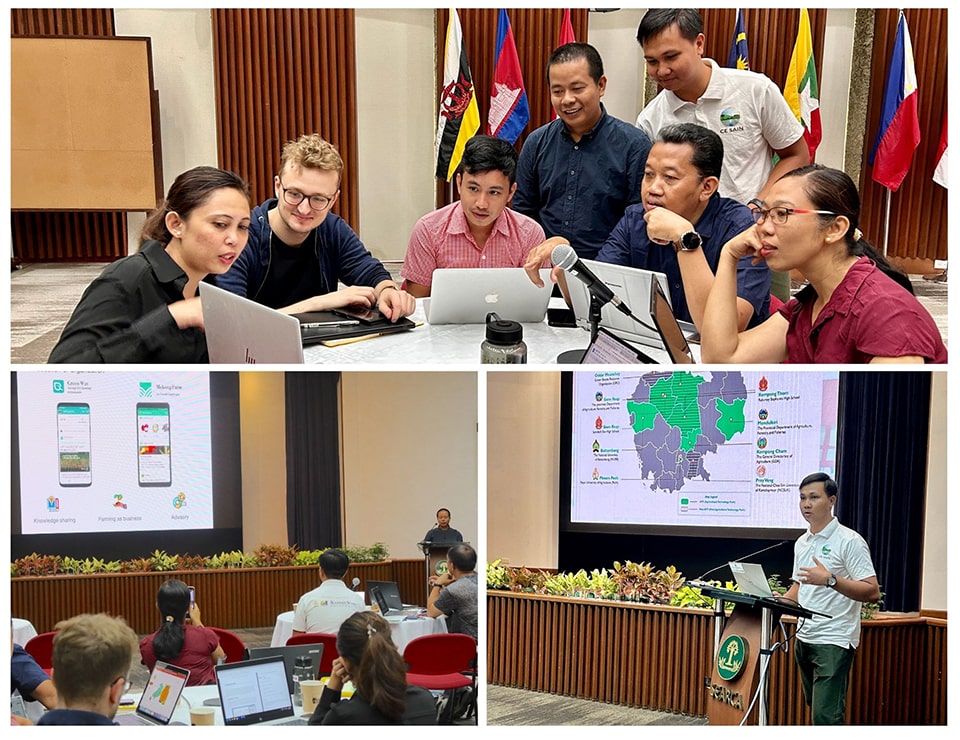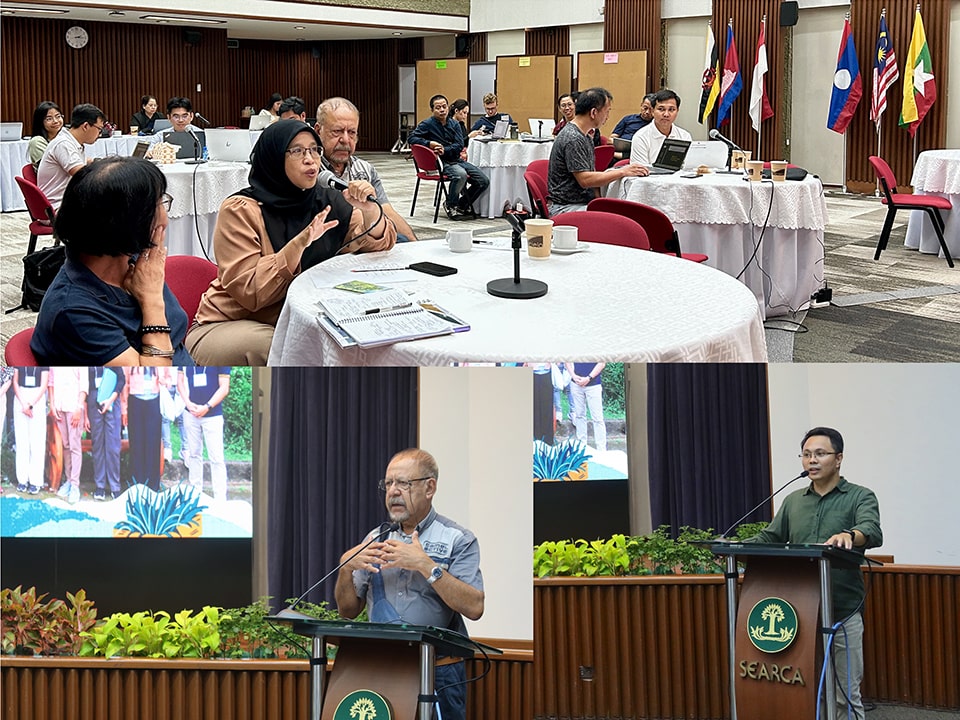 The participants with the training management group from SEARCA and IIRR during the opening program of the onsite session on 25 September 2023 at the IIRR James Yen Center, Cavite.
The participants with the training management group from SEARCA and IIRR during the opening program of the onsite session on 25 September 2023 at the IIRR James Yen Center, Cavite.
Climate-smart agriculture (CSA) educators and practitioners from six countries have completed a blended course on climate-smart villages (CSV), which was jointly conducted by the Southeast Asian Regional Center for Graduate Study and Research in Agriculture (SEARCA) and the International Institute of Rural Reconstruction (IIRR) in September 2023 via Zoom and onsite in the Philippines.
Titled Climate-Smart Villages as Platforms for Community-Level Anticipatory Climate Adaptation to Improve Food Security and Resiliency: A Roving Workshop, the blended course started with 22 participants in a two-day webinar on 19-20 September 2023. Renowned speakers on agriculture, nutrition, food systems, community innovations, and nature-based solutions have introduced them to the concepts and principles of CSA and CSVs.
Meanwhile, the onsite sessions held on 25–30 September 2023 featured learning sites in the provinces of Cavite, Quezon, and Laguna, Philippines. The participants embarked on a roving workshop, where they witnessed first-hand how food systems-sensitive climate change adaptation (CCA) platforms are established, sustained, and scaled in communities.
"Communities are our partners in development," said Ms. Emily Monville-Oro, acting Asia regional director of IIRR, during her opening message. "Gone are the days when we go to the community with set programs because we felt like they needed them. Now, we have recognized that communities have something to offer," she continued.
"We have learned so much from our partnership with the community. It was a mutual learning. I hope you also learn from this visit," Ms. Monville-Oro further said. "Have an open mind, free from biases and preconceived ideas or solutions that we already have," she added.
 The roving workshop featured at least 10 learning sites where the participants engaged with local stakeholders and discussed about CSA approaches and technologies.
The roving workshop featured at least 10 learning sites where the participants engaged with local stakeholders and discussed about CSA approaches and technologies.
Field visits to climate-smart villages
The participants were grouped into two learning teams and were tasked to observe CSV concepts and social processes, discuss with farmer learning groups, and reflect on their findings from the field visits and interactions with farmers.
The roving workshop kicked off at IIRR's Bio-Intensive Garden (BIG) Learning Center, showcasing an agro-ecological approach to gardening. The participants also visited an indigenous multistory agroforestry site for coffee and an intensive organic farm in Cavite. The delegation then traveled to Quezon to visit the Bureau of Fisheries and Aquatic Resources (BFAR) for a briefing about their programs, particularly the climate adaptation technologies for the fisheries sector.
In Guinayangan, Quezon, participants visited six farming villages where they learned about the following CSV approaches. These approaches include: restoration of coffee-based systems and nursery techniques; integrated lowland and irrigated rice-based farming system; agroforestry with upland cacao and fruit trees; intensification of coconut-based farming systems with coffee and fruit trees; women-led diversified farming system; biodiversity custodian; youth-led native chicken breed conservation; and coastal resource management. Participants also checked out two farm demonstration sites of the local government of Guinayangan.
The final stop of the roving workshop was at OMG Farm in Los Baños, Laguna, where SEARCA Director Dr. Glenn Gregorio gave a briefing on crop diversification, tissue culture technology, and digital agriculture using drone technology.
 The participants presented their reflections from the roving workshop and their respective re-entry action plans during the closing program at the SEARCA Headquarters on 30 September 2023.
The participants presented their reflections from the roving workshop and their respective re-entry action plans during the closing program at the SEARCA Headquarters on 30 September 2023.
Reflections on and applications of CSV
On the last day, the participants presented their reflections and findings from their field visits to CSVs integrating climate-smart approaches, strategies, and technologies. Recommendations for enhancing CSA interventions and social and institutional processes were also drawn out while sharing their reflections.
The participants then presented their individual re-entry action plans (REAPs) for implementation in their respective organizations based on their learnings from the course. A group of panelists provided critique and further insights during the REAP presentation. The panelists were: Dr. Julian Gonsalves, IIRR senior program adviser and technical consultant of the roving workshop; Dr. Nur Azura Adam, SEARCA deputy director for programs; and Ms. Dianne Arboleda, program manager of IIRR Global Learning.
"Innovation doesn't have to be expensive. Sometimes, the villages have ingenious ways of overcoming climate change. It looks so simple, but it works," said Dr. Nur Azura Adam, SEARCA deputy director for programs, in her message to the participants from Cambodia, Indonesia, Germany, Myanmar, the Philippines, and Thailand. Dr. Nur also expressed hope for the participants' respective REAPs to be implemented and become their own success stories.
"For my current position, this training enabled me to ask the right questions and have more fundamental concepts in mind when developing interventions in the areas of CCA and nutrition security," said Mr. Martin Mueller from Germany.
Meanwhile, Mr. Wisnu Lunardi of Indonesia also expressed how the course has added value to his current role as Knowledge Associate in his organization. "It will help me design a curriculum and knowledge-based model for our internship program and our farmers, as many things I learned from the course are new to our farming communities in Indonesia," he said.
This year's CSV course is the second activity jointly offered by SEARCA and IIRR since it was first presented in 2019. SEARCA's Training for Development Unit under the Education and Collective Learning Department has coordinated and co-organized the course with IIRR.
 SEARCA and IIRR experts provided constructive feedback on the participants' re-entry action plans to be implemented in their respective organizations.
SEARCA and IIRR experts provided constructive feedback on the participants' re-entry action plans to be implemented in their respective organizations.